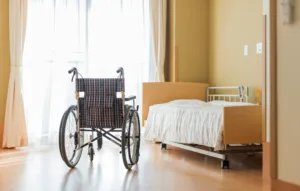To prevent resident on resident violence, nursing homes should always maintain an adequate number of staff to care for each resident and fully supervise resident interactions. Nursing homes should ensure there is plenty of supervision for all occasions when multiple residents are gathered together or interacting. Nursing homes should also make sure all employees are trained to prevent violence by other residents and intervene effectively when necessary.
Additionally, nursing homes should give special supervision to residents with a history of violence or aggression, as well as to residents with dementia and behavioral conditions which might make them more prone to aggression against other residents.
Nursing homes should also allow all residents enough privacy, and ensure that the facility is not overcrowded. Nursing homes should keep residents from becoming bored and restless by allowing them to participate in social activities, providing them with varied entertainment opportunities, and facilitating mobility and exercise. If a facility fails to protect its residents, a victim or their family should call a Georgia nursing home resident violence lawyer.

Signs of Resident on Resident Violence
Signs of resident on resident violence may include unexplained physical injuries like bruises, cuts, and scrapes, as well as emotional and mood changes. A victim of resident on resident violence may become anxious or depressed, or may seem emotionally withdrawn.
A resident who has experienced violence from another resident may seem reluctant to leave his or her room or reluctant to participate in activities involving other nursing home residents. They may even seem afraid or wary of other residents, and may be unwilling to give an explanation for this fear.
There may also be signs in nursing home management that indicate the
presence of violence by other residents, or at least the increased likelihood of such violence occurring. If a nursing home seems short on staff, fails to provide enough supervision during resident interactions, or fails to provide residents wi
th enough individualized care, these are signs that violence by other residents is more likely to occur in that nursing home.
For a free legal consultation with a nursing home resident violence lawyer serving Georgia, call

Georgia Nursing Home Resident Violence Lawyer Near Me (678) 823-7678
Addressing Resident on Resident Violence
If you suspect your loved one has been a victim of other residents, you should first speak to your loved one if possible. Be patient and sympathetic as you listen to your loved one. If you still suspect violence after speaking to your loved one, or if your loved one has confirmed your suspicions, report the nursing home to Georgia Healthcare Facility or to a local ombudsman. Additionally, ensure your loved one receives all the help they need, including medical attention for any injuries, therapy if necessary, and emotional support.
Finally, if you suspect your loved one has been a victim of nursing home violence, you should consult a lawyer to find out how to protect your loved one’s legal rights and help him or her receive compensation for injuries and damage. One of our experienced Georgia lawyers will be able to tell you whether or not you have a claim against the nursing home, and help you file a claim on behalf of your loved one. In taking legal action, you should act as soon as possible, since there is often a limited time period in which you can file a claim.

Why does Violence by Other Residents Occur in Nursing Homes?
Resident on resident violence often occurs in nursing homes that are short on staff, which means residents do not receive an appropriate level of attention and care. When there are not enough staff to monitor residents and supervise activities, violence by other residents may occur because staff are not on hand to intervene, or violence may occur without staff noticing at all.
Resident on resident violence can also occur in nursing homes that are overcrowded: when residents are not given enough privacy, they may become irritated with other residents or become frustrated, and this may lead to aggression. In some cases, one resident may engage in behavior like crying or yelling repeatedly, which can annoy other residents and contribute to violence. Or violence may occur when one resident makes a negative comment, insults another resident, or invades another resident’s privacy.
Other conditions that contribute to violence by other residents include boredom and restlessness, and the presence of conditions like dementia which may cause residents to become impatient or aggressive. Additionally, when nursing home staff are untrained or inexperienced, they may not be equipped to step in and prevent resident on resident violence.


Call a Georgia Lawyer for Claims Involving Resident on Resident Violence
By law, nursing homes are responsible for protecting residents from violence and abuse. This extends to violence from other nursing home residents. In most cases, violence by other residents can be prevented, which means that a nursing home may be held responsible for violence by other residents when it causes physical or emotional harm to a resident.
Nursing homes are also legally required to provide residents with certain privacy rights, and to assure residents a certain quality of life that includes dignity, freedom, and safety. When a resident becomes a victim of violence, these rights are violated, and in many cases, the nursing home may be at fault.
Because of its legal duty toward residents, a nursing home held responsible for violence must compensate the injured resident for damages. Depending on the situation, this might include medical bills for any physical injuries caused by the violence, or for therapy related to the incident. Damages can also include money for physical and emotional pain and suffering the resident underwent as a result of the violence which occurred in the nursing home.
FAQ about Georgia Nursing Home Resident Violence
1. What measures should nursing homes take to prevent resident-on-resident violence? Nursing homes should maintain adequate staffing levels, supervise resident interactions closely, provide training to employees on preventing and intervening in violence, supervise residents with a history of violence or aggression more closely, ensure residents have enough privacy, prevent overcrowding, and engage residents in social activities to prevent boredom and restlessness.
2. What are the signs of resident-on-resident violence? Signs include unexplained physical injuries (bruises, cuts, scrapes), emotional and mood changes, anxiety, depression, withdrawal, reluctance to leave their room or participate in activities, fear or wariness of other residents, and any signs of inadequate care or supervision by the nursing home.
3. How should one address suspected resident-on-resident violence? First, talk to the affected resident in a patient and sympathetic manner. If violence is suspected, report the issue to the Georgia Healthcare Facility or a local ombudsman, ensure the victim receives medical attention, therapy, and emotional support, and consult a lawyer to explore legal rights and compensation claims.
4. Why does violence by other residents occur in nursing homes? Factors include understaffing, overcrowding, lack of privacy, boredom, restlessness, conditions like dementia causing impatience or aggression, and untrained or inexperienced staff.
5. What legal responsibilities do nursing homes have regarding resident-on-resident violence? Nursing homes are required to protect residents from violence and abuse, including that perpetrated by other residents. They must provide a safe environment that respects residents’ privacy, dignity, freedom, and safety. Nursing homes may be held liable for failing to prevent violence, and victims may be entitled to compensation for damages, including medical bills and pain and suffering.
For more detailed guidance or to pursue a claim, speaking to a Georgia nursing home resident violence lawyer is recommended.





